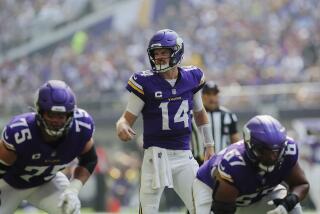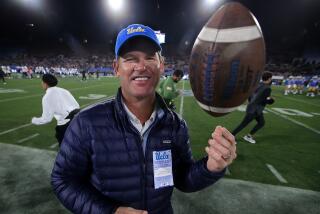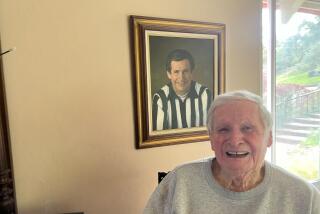Trent Dilfer: Type A guys make successful quarterbacks
The sixth overall pick in the 1994 draft, TRENT DILFER spent 14 years in the NFL, playing for Tampa Bay, Baltimore, Seattle, Cleveland and San Francisco. He won a Super Bowl with Baltimore during the 2000 season and now is an ESPN analyst. Although he was regarded as a “game manager” with the Ravens, Dilfer said that the defense was so good he seldom got the chance to prove he could bring the team back from a big deficit.
All successful quarterbacks have a self-belief and decisiveness to them.
You can make the wrong decision, but make it decisively and many times it works out in your favor.
When you question yourself, when you’re not willing to pull the trigger and let it rip — see it, trust it, let it rip. Type A personalities do that, others don’t. They’re always questioning themselves. They’re not confident enough to make that critical decision when it matters the most.
Type A’s walk into a room and don’t ask a question, they make a statement. People asked me at the draft, “Why did you put Andy Dalton ahead of Blaine Gabbert?” I say, “No brainer: Alpha male. Andy Dalton walks into a room and makes a statement. He doesn’t ask questions.”
It holds true off the field too. For instance, I always want to know who’s going to drive the car. If we’re all going out to get an In-N-Out burger in a minivan, who’s driving?
Here’s an example: Steve Young and I work as ESPN analysts on Monday Night Football. Every week, he and I drive together when the game is over. It will be maybe 1 a.m., and we’ll take a car to an airport hotel. It’s a running joke with us: Every week, it’s a fight for the keys.
It’s funny: My wife has driven me maybe three times in our 18 years of marriage. I don’t ever ride shotgun. I always drive. Yet, Steve somehow is always driving. I finally understand why he’s a Hall of Famer and I’m not, nor will I ever be. Because he’s always driving the flippin’ car!
The fact is, I lose that battle every single week to the guy. And I don’t know how I lose it. The quarterbacks that failed but had supreme talent? Every one of them not type A. Every one of them is sitting in the back seat.
That self-belief is essential. You face a lot of failures. John Elway, Brett Favre, Steve Young — go down the list — most of them faced major setbacks. What one would call a failure, they would call a “temporary setback.”
The reason why you walk into a room and make a statement instead of asking a question is because really you think you know more than the rest. You’re a legend in your own mind. We’re all the same. That’s why it works. Because while everybody else is telling you that you stink or you failed or all the ways you can’t, all you’re thinking about is all the ways you can.
All the ways you are going to prove them wrong.
It’s the psychology of people saying John Elway can’t win a Super Bowl — he never thinks he can’t. All he’s thinking about is all the ways he can. That’s the difference.
Your mind’s eye sees you as a success all the time. Any interruption in that process is simply internalized as a temporary setback. “This is just a setback from where I’m eventually going to end up.”
I think the great players in any sport feel the same way. The difference is that the rest of their team doesn’t rely upon that vibe as much as the football team does.
With a pitcher, I’m sure there is tremendous influence. But with a quarterback, on a Friday afternoon, if your quarterback is not feeling it and not projecting confidence and swagger and belief in everybody, the rest of the team is deflated.
When the quarterback throws the pick — which is going to happen — if he’s looking down in the dirt like, “Oh, I stink. That’s going to happen again.” You’re going to influence negatively everybody on your team.
More to Read
Go beyond the scoreboard
Get the latest on L.A.'s teams in the daily Sports Report newsletter.
You may occasionally receive promotional content from the Los Angeles Times.










